At the start of the COVID-19 pandemic, just as our predicament finally began to sink in thanks to social media and horrific news stories of deaths in hospitals around the world, artists were the calming salve that gave our global community hope. Opera singers on balconies, musicians holding outdoor patio concerts for their neighbours, and Instagram stories provided by visual artists sharing their creative processes got the rest of us through the worst of it.
Yet, due to the cancellation of gallery showings, the sudden disappearance of performance spaces, and the sort of economic uncertainty demonstrated by toilet paper panic-hoarding, financial precarity became the norm for many in the arts community. As such, Toronto-based figurative painter Benny Bing’s fundraising collaboration with Puzzle Lab, a Covid inspired offshoot of Victoria, BC-based design and branding agency Studio Robazzo, is a perfect merging of the United Nations Sustainable Development Goals on Responsible Consumption and Production and Partnerships for the Goals.
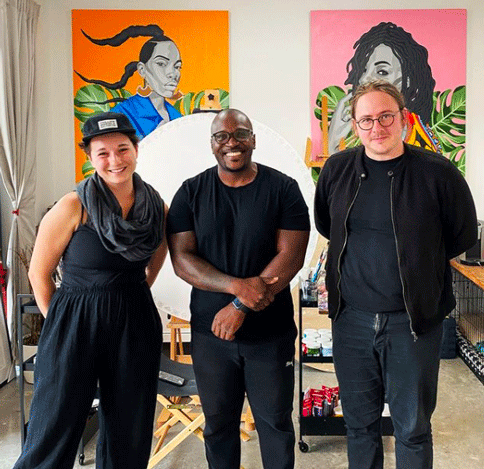
Together, the creative entities have released a limited edition, eco-friendly, laser-cut series of wooden puzzles with a portion of the proceeds going to Toronto arts organization Artscape. Artscape is a not-for-profit organization with a mission to make space for creativity and transform communities through affordable artist housing, event and performance space, and knowledge sharing with local artists. I spoke to Benny Bing and Tinka Robev, who manages artist collaborations for Puzzle Lab, about the experience.
“We launched Puzzle Lab last November and decided to get artists involved because we wanted to put nice art on our puzzles,” said Robev from Puzzle Lab’s west coast headquarters. “Since we’re not artists, we decided to become curators and followed all these incredible Canadian art pages. One day Benny’s work came up in my feed and I thought it was cool so I reached out to his marketing person who told me Benny was interested and the rest was history.”
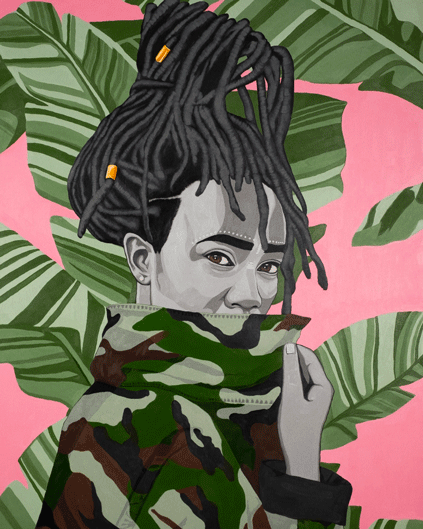
Bing, initially skeptical of this stranger reaching out to him over Instagram about a puzzle, changed his mind only after perusing Puzzle Lab’s site.
“I thought, this is amazing,” Bing said. Throughout the pandemic, Bing had been trying to figure out inventive ways to raise money for Toronto’s artists. “I thought this would be a great project to take on because, first, my work would look incredible on these puzzles. Second, most of the things I do are either limited edition or small batches, so having a limited release collector’s item of a puzzle was a great opportunity that appealed to me.”
Even before Puzzle Lab’s inception, Studio Robazzo already had a well-known connection to their arts community in British Columbia. A mural by local muralist “Kay Galivan”, commissioned by the design firm back in 2018, still brightens the outside facade of their office. I was curious about the importance of art to the design agency.
“As a creative and visual person for the last decade, art is important because just seeing something beautiful gives you a rush of dopamine,” Robev explained. “It’s important for us to not just take artists’ work and say we’re going to give you exposure, because we’ve been in that position as young designers starting out where people didn’t want to pay us money. They wanted to pay us in exposure, which is totally meaningless.”
For Robev, the dreaded “exposure bucks” concept, where creatives are expected to do free labour for the benefit of being seen, is nothing more than a watered-down version of trickle-down economics.
“When we curate artwork and approach the artist, we always pay the artist a royalty on every puzzle sold, because we’re a very ethically minded business,” said Robev. “Giving back to artists and different causes is a huge part of our growth strategy.”
“I either donate a painting to be auctioned off or I donate personal funds to charities that speak to me, which I’ve been doing since I started painting,” Bing remarked. “When I started out, a lot of people gave of themselves to me, so I think it’s important that I give back. With this in mind, I felt it necessary to give back to the organization that I sit on the board at because I can see firsthand how tough it’s been for the community.”
As a Black artist whose first puzzle “Nkatha” is borrowed from his series celebrating Black women entitled “Bloom”, representation also matters and was influential in his decision to partner with Puzzle Lab.
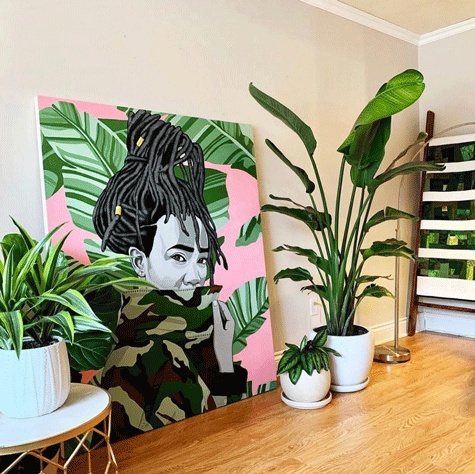
“Don’t get me wrong, I love landscape puzzles, but when you see yourself represented in the puzzle that you’re doing, it means a lot,” said Bing. “Last night, my wife and I were trying out the ‘Nkatha’ puzzle and I said to myself, pause for a second and just take in seeing your work on a puzzle. It was very fulfilling.”
Aside from the use of wood to make the puzzles, Puzzle Lab used a combination of algorithms, one of which was based on the natural geometry of coral reefs, to craft Bing’s puzzle.
“There’s a new algorithm (created by co-founder Andrew Azzopardi) based on the traditional jigsaw cut puzzle patterns that are all warped and funky, while Benny’s puzzle is a combination of both,” said Robev.
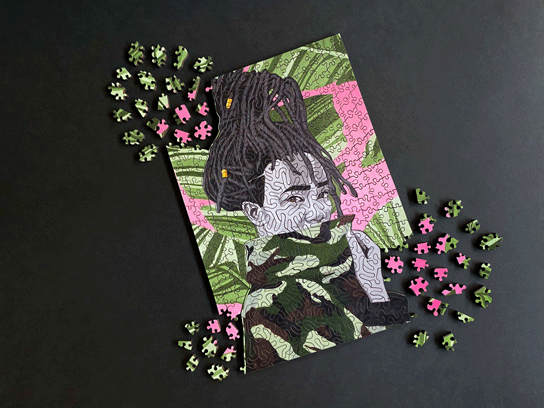
“If we’re not being an ethical business we might as well not exist,” Robev insisted. “We’re very aware of what’s happening in the world and it’s not really good news. So although we’re trying to participate in capitalism, because it’s the position we’re all in, we want to do it in a way that’s not going to harm the environment or take advantage of people.”
The agency keeps its carbon footprint as small as possible by using big outsourced overseas factories as little as possible and packaging the puzzles without any plastic. In this way, Puzzle Lab lives up to a core tenet of sustainability.
“We’re also into this mix of analog and digital,” Robev added, speaking to a harmonious balance between the two. “We’re creating a very analog product that requires no tech to use, but the way the puzzle is made, from the algorithms to the laser cutting, requires so much technology.
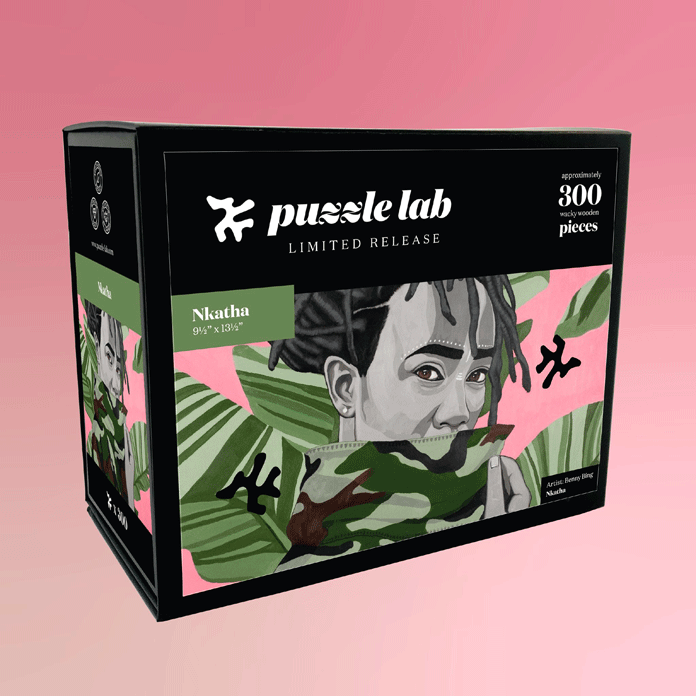
“As an artist, it depends on the medium and material,” offered Bing, aware of the toxicity of certain paints. “I switched over to acrylic latex paint, which I find is both better for the work and the environment. In my earlier years, I used to discard a lot of canvases, but now I recycle a lot of the canvases that someone else might choose to throw away.”
Perhaps because he’s an artist, Bing had an immediate appreciation for Puzzle Lab and what they do. “You can feel the quality in each piece, and to know that it’s eco-friendly and made with a lot of care is very important to me.”
As for future collaborations, there are more limited-edition Benny Bing puzzles on the way. The first of three, the second puzzle will be released in mid-November just in time for Christmas. Meanwhile, you can still get your hands on the few remaining “Nkatha” puzzles and support Toronto’s arts community by ordering online here.
Benny Bing:
Instagram: @bennybing
Twitter: @bennybing
Puzzle Lab:
Instagram: @the.puzzlelab
Facebook: @the.puzzlelab
